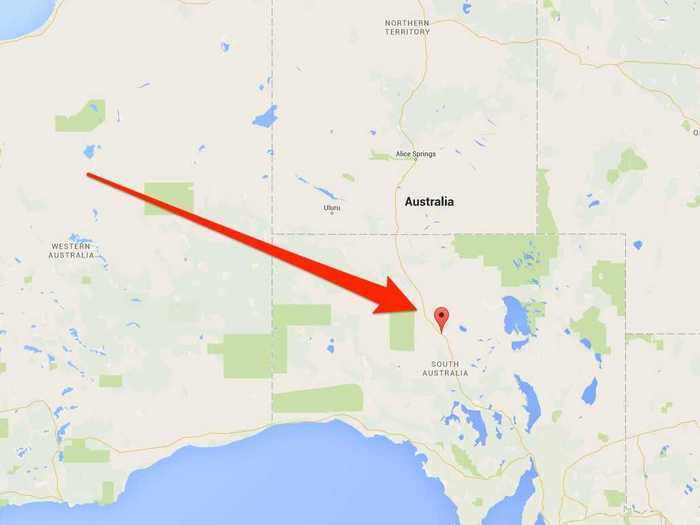
Residents have turned the old opal mines into makeshift homes to escape the oppressive heat.Mark Kolbe/Getty Images

The town is referred to as the "opal capital of the world." Coober Pedy is an Aboriginal word that roughly translates to "white man in a hole."

Even in the shade, it's common to feel temperatures of 100-plus. Much to the dismay of locals and visitors, there's little rainfall to provide relief from the harsh sun.

According to ABC News, Coober Pedy sources its water from the Great Artesian Basin located about 15 miles away from the town.

After World War I, soldiers returned home and began mining the terrain for opal, a precious gem.

When the water receded, the minerals from the ocean's seabed filled cracks in the earth and created colorful opals in the terrain.

Many turned the mines into makeshift homes to escape the oppressive heat.

The town has an eerie, other-worldly feel to it, despite being home to around 2,500 residents, according to the District Council of Coober Pedy.

They'll likely spend most of their lives there, escaping the harsh Australian sun and making their home beneath the Australian Outback.

Rooms like this, the bedroom of Faye Nayler, a woman who picked and shoveled her own home in 1960, are the norm.

The underground homes have all the amenities of traditional ones — internet access, electricity, and water.

The only difference between "normal" homes and those in Coober Pedy is that these homes have no access to sunlight.

Visitors must pay an entrance fee to tour Faye's Underground Home, but it's considered one of the must-see spots in Coober Pedy.

The church is located 55 feet below the Earth's surface.

Underground Books was converted from a 1930s-era mining shaft into a small bookstore filled with Coober Pedy history books and more.

The hotel bills itself as "quiet, cool, dark and airy" on its website, adding: "Get the best night's sleep of your life."
The town of Coober Pedy is only accessible by a small airstrip, by coach tour or private car, and via the Ghan railway line running between Darwin and Adelaide.

A room in the cozy inn that runs for around $150 a night.

Both of the town's supermarkets are located on the same street above ground.

The Opal Bug is an opal shop in Coober Pedy that sells everything from the gems to jewelry and watches. However, many visitors also like to visit the shop to see the famous opal-colored Volkswagen Beetle.

This store's outdoor sign advertises that it sells everything from DVDs and video games to fossils and opals.

Inhabitants and visitors need to watch their step, especially at night.

Signs just like this one are scattered all over the town.

Australia produces roughly 95% of the world's precious opal supply, and mining is still a popular trade in Coober Pedy. However, most mining is fully mechanized today.
 I spent 2 weeks in India. A highlight was visiting a small mountain town so beautiful it didn't seem real.
I spent 2 weeks in India. A highlight was visiting a small mountain town so beautiful it didn't seem real.  I quit McKinsey after 1.5 years. I was making over $200k but my mental health was shattered.
I quit McKinsey after 1.5 years. I was making over $200k but my mental health was shattered. Some Tesla factory workers realized they were laid off when security scanned their badges and sent them back on shuttles, sources say
Some Tesla factory workers realized they were laid off when security scanned their badges and sent them back on shuttles, sources say World Liver Day 2024: 10 Foods that are necessary for a healthy liver
World Liver Day 2024: 10 Foods that are necessary for a healthy liver
 Essential tips for effortlessly renewing your bike insurance policy in 2024
Essential tips for effortlessly renewing your bike insurance policy in 2024
 Indian Railways to break record with 9,111 trips to meet travel demand this summer, nearly 3,000 more than in 2023
Indian Railways to break record with 9,111 trips to meet travel demand this summer, nearly 3,000 more than in 2023

Copyright © 2024. Times Internet Limited. All rights reserved.For reprint rights. Times Syndication Service.